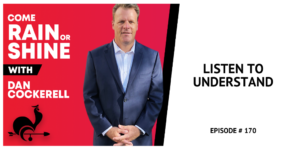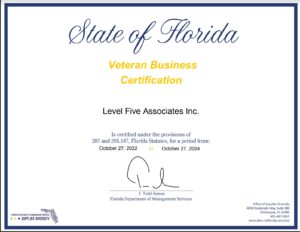A few months ago, I was happy to be a guest on Dan Cockerell’s podcast, “Come Rain or Shine.”
We started out by discussing some of my military history, starting with my unlikely journey to West Point.
Moving ahead, we talked a bit about how the military turned itself around in the 1980s, with a change in focus, ‘from compliance to commitment.’
From there, we took a deeper dive on one of the most important leadership concepts: listening. In fact, Dan titled this episode of ‘Come Rain or Shine’ as “Listen to Understand,” which I really appreciate. 
One example I gave in our conversation: Do you tend to interrupt? If so, it is a clear sign you aren’t really paying attention — in fact, you might be listening with the intention to interrupt — a kind of verbal gamesmanship that is often all about ego and nothing about leadership.
Dan brought up that he was very intrigued by the title of one of my past books, “Cows In the Living Room.” In addition to explaining the story behind that phrase, I explain what it means in the context of being a bad leader.
It means: making a habit out of accommodating the easiest way forward… and then getting accustomed to those habits. All organizations and teams have ‘cows in their living rooms’ — bad processes they have come to accept in the name of simply getting on with day-to-day operations. It is up to us as leaders to be willing to make the effort to address these problems instead of ignoring them.
As we wound down our conversation, we touched on how leaders with courage are willing to underwrite mistakes — to an extent, of course! I gave an example from my own past in the military that provides a humorous illustration of that idea.
Dan is a perceptive and insightful interviewer. I think you’ll really enjoy our conversation. You can listen to our talk in full here:
Enjoy the journey!
Did you find this post beneficial? If so, please consider sharing it with your audience using one of the choices below. It’ll just take a second, but could improve someone’s work habits for a long time to come.





